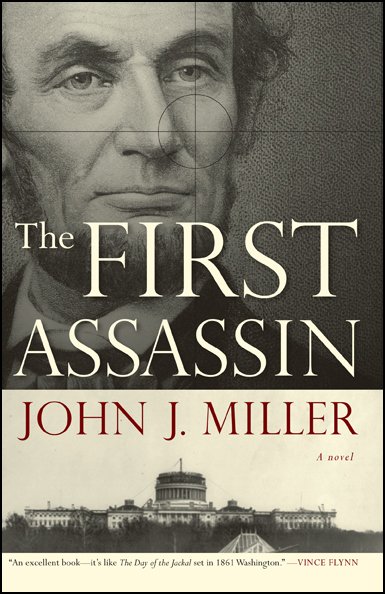The First Assassin by John J. Miller
Tuesday, November 3, 2009
posted by Leo Grin
 Print This Post
Print This Post
 Good friend of The Cimmerian John J. Miller (who has covered Robert E. Howard positively and perceptively in The Wall Street Journal, interviewed Rusty Burke about the Del Rey Conan books for National Review Online, and highlighted Paul Sammon’s Conan the Phenomenon on his Between the Covers podcast) has released his first novel, a thriller set in the early days of the Civil War. Titled The First Assassin, it’s been getting great buzz from people whose opinions I trust in matters literary:
Good friend of The Cimmerian John J. Miller (who has covered Robert E. Howard positively and perceptively in The Wall Street Journal, interviewed Rusty Burke about the Del Rey Conan books for National Review Online, and highlighted Paul Sammon’s Conan the Phenomenon on his Between the Covers podcast) has released his first novel, a thriller set in the early days of the Civil War. Titled The First Assassin, it’s been getting great buzz from people whose opinions I trust in matters literary:
“An excellent book — it’s like The Day of the Jackal set in 1861 Washington.”
— Vince Flynn, #1 New York Times bestselling author of Pursuit of Honor
“Packed with fascinating information, superb characters, and sublime plot twists, The First Assassin is one of the most exciting thrillers I have read in a long, long time. This is historical fiction at its best and John J. Miller is the hot new author everyone will be talking about.”
— Brad Thor, #1 New York Times bestselling author of The Apostle
“The story moves with swift suspense, but Miller’s real achievement is to take us inside a mindset nearly lost to time, and to create identifiable, sympathetic characters on all sides, including those who are willing to do murder to preserve the Confederacy and its ‘peculiar institution.’”
— Andrew Klavan, author of Empire of Lies
“The First Assassin knocked me out. Utterly compelling, the novel sweeps the reader along multiple storylines which converge at one point, one moment, where history pivots on its axis. A skilled writer of non-fiction, here Miller uses his knowledge and research to create a powerful thriller that is completely believable. With its accurate period details and pitch-perfect characters — from house slaves to Washington, D.C. careerists to a mysterious hitman — there’s not a false note in the whole book. Read it and tell me I’m wrong.”
— Robert Ferrigno, author of Heart of the Assassin
On his blog John has written a number of posts on the genesis of his book and the choices that went into the editing and publishing of it. I was particularly interested in his thoughts on print-on-demand, a form of publishing that has really come into its own in recent years (witness the large number of POD books in Howard scholarship, most of which sold quite well considering the size of the field and the generally small market for literary criticism). More and more it’s becoming the norm for true book lovers to never set foot in a brick-and-mortar bookstore, places that are quickly becoming glorified coffee shops featuring clueless employees, frustratingly narrow inventories, and obscene prices. They are fast degenerating into the Blockbuster Videos of the publishing world, while online venues like Amazon serve as Netflix. Of course, for the lucky few having a big New York publisher’s marketing muscle behind you is a good thing, but the vast majority of authors can make more money with a lot less hassle by self-publishing. What used to be called the “mid-list” has vanished from the big houses and migrated to POD and smaller presses, to the point where it’s normal to see authors with already substantial careers resorting to POD when the economics make sense. It’s great to see entire genres ignored by the big conglomerates flourishing guerrilla-style like this, especially older stuff by politically-incorrect pulpsters that often are too forgotten or risque for today’s coterie of dainty mainstream editoresses.
The First Assassin is going to be listed on Amazon soon, but John gets more dough if you buy directly from the publisher, so head on over and pick up a copy. At $15 for a trade paperback (Morgan Holmes’ favorite format — not), it’s certainly competitively priced with the product put out by the big New York houses. And if you’re not regularly reading John’s blog, Hey Miller, you should put it into your rotation, both for the new material and for the reprinting of old items about stuff we fantasy fans care about, things like Edgar Allan Poe, Edgar Rice Burroughs, Robert Heinlein, and of course Conan, Beowulf, and David Gemmell.

